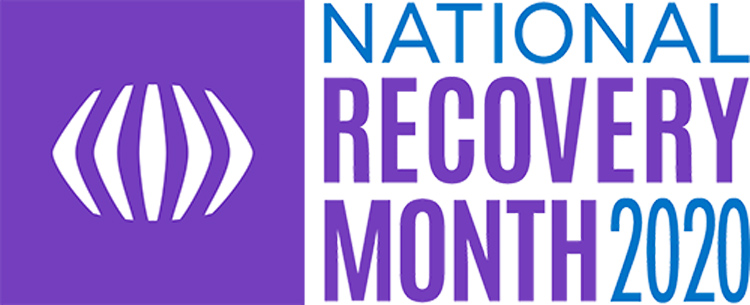September Is National Recovery Month: A Reminder That Recovery Is Always Possible
 National Recovery Month is observed every September to recognize the struggles faced by those who have been diagnosed with substance use disorders or other mental health conditions. For 31 years, National Recovery Month celebrations have served as a reminder that there’s always hope for recovery no matter what challenges a person has faced in the past.
National Recovery Month is observed every September to recognize the struggles faced by those who have been diagnosed with substance use disorders or other mental health conditions. For 31 years, National Recovery Month celebrations have served as a reminder that there’s always hope for recovery no matter what challenges a person has faced in the past.
Celebrating Connections
The 2020 National Recovery Month theme, “Join the Voices for Recovery: Celebrating Connections,” encourages us to celebrate the progress people in recovery have made while respecting that each person’s recovery journey is unique. At St. Joseph Institute for Addiction, we’d like to encourage everyone to use National Recovery Month as an opportunity to learn more about the challenges faced by people who are struggling with drug or alcohol addiction—including those who’ve relapsed in the past.
Genetics Aren’t Destiny
Studies involving identical twins and people who were adopted have shown that genetic factors do play a role in whether a person develops a substance use disorder. However, this doesn’t mean that you’re “doomed” to struggle with addiction if you have a parent, grandparent, or sibling who abuses drugs and alcohol.
Genetic factors only account for about half of your total risk of developing a substance use disorder. The other half is attributed to environmental factors. Common environmental risk factors that can increase a person’s risk of addiction include living in a home where drug and alcohol abuse is viewed as normal behavior, socializing with friends who engage in substance abuse, and experiencing stressful or traumatic situations as a child or young adult. These environmental risk factors can be mitigated by factors such as guidance from a spiritual leader or counselor, positive mentoring relationships, access to accurate information about promoting mental health, and engaging in hobbies that help you reduce stress.
Addiction Is a Chronic Illness, But Treatment Is Available
Addiction is considered a chronic illness, much like type 2 diabetes or cardiovascular disease. This means there’s no quick fix that can pronounce a person “cured” of their affliction. However, the disease can be managed with a combination of medication, counseling, and lifestyle modifications.
Although it’s never too late to seek help for a substance use disorder, addiction is generally easier to manage in the early stages. Waiting until a person has hit a “rock bottom” moment, such as losing their job, ending a marriage, or having a near-fatal overdose merely creates additional challenges. High-functioning addicts may be able to hide the effects of their condition temporarily, but addiction is a progressive illness. Without treatment, they’ll slowly find that it becomes more difficult to make it through each day.
For someone who suffers from addiction and a co-occurring mental health disorder such as depression or anxiety, both issues must be addressed simultaneously. Often, people with underlying mental health conditions use drug or alcohol abuse to self-medicate symptoms that interfere with their day-to-day functioning. If the reason for their ongoing substance abuse isn’t addressed, they are much more likely to relapse after leaving treatment.
Persistence Is Key
Relapse among people with substance use disorders is quite common. Relapse is understandably frustrating, but it’s not the end of the world. Lasting sobriety requires making changes to almost every aspect of a person’s life, which takes time.
Consider how losing weight is often one of the treatment recommendations for someone with type 2 diabetes. Dieting is notoriously difficult, but every expert agrees the key is not to give up and throw in the towel the first time you choose a candy bar instead of an apple for your afternoon snack.
If you’re in recovery, be kind to yourself. Recognizing the signs of a substance use disorder and asking for help was a huge step forward. If you had a moment of doubt and relapsed, that’s OK. You don’t need to shame or punish yourself for your mistake. Acknowledge your struggle and work with your treatment team to develop a plan that will help you move forward.
We’re Ready to Help
At St. Joseph Institute for Addiction, we believe that treatment for substance use disorders needs to be personalized to fit individual needs. Each of our clients receives a detailed intake assessment to evaluate the physical, mental, emotional, and spiritual aspects of their condition before our treatment team creates a holistic treatment program. After graduating from our Pennsylvania residential treatment center, our clients then have access to relapse prevention and continuing care services that support their transition back to independent living.
We firmly believe that recovery is possible for anyone who desires it, and we will remain open for new patients throughout the COVID-19 coronavirus pandemic as an essential service provider. If you’re ready to take the next step in your recovery journey, we can help.
To learn more about SJI dual diagnosis treatment in Pennsylvania, and our programs, please contact us at (814) 228-8881.
